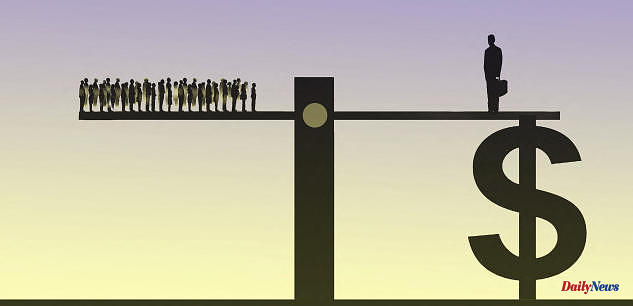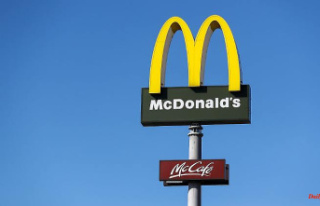Since 2014, France's wealth has been growing and the number of wealthy people is on the rise. The Observatory of Inequalities published its Wednesday, June 1 report pointing out this fact. The institute estimates that rich people would need to be at least 4.5 million to make at least 3,673 euros (for a single individual) after taxes. This is more than 93% of French citizens. According to the Observatory, these wealth accumulations were caused by the Covid-19 crisis, which benefited the richest, but also tax policies implemented by the majority of Emmanuel Macron.
Louis Maurin (director of the Observatory of Inequalities) explains to "l’Obs" why he believes it is necessary to bring into public debate the notion of "threshold of rich" (the income level from which one is considered wealthy), which is a concept that exists in France but is not embraced by French politics.
Your report explains that the rich are gaining ground. What is the age of this trend? How can it be explained and why?
We see that the years 1990-2000 were extremely favorable for the wealthy, whose numbers have increased substantially. This percentage decreased over the five-year terms Francois Hollande, Nicolas Sarkozy, and then increased again in 2014. We must be careful with the analysis. The latest data that we have is from 2019. We can already see that the Covid crisis had positive effects on the finances and savings of the wealthiest.
These groups have also been benefited by some measures taken by Emmanuel Macron. These figures show that businesses are recovering from the crisis with a significant increase in high-earners in companies.
You specifically mention the responsibility for tax reforms initiated by Emmanuel Macron. Which ones?
The elimination of the wealth tax which is a cost-saving measure for the wealthy each year. Also, the single flat-rate levie which has made a previously proportional levy a flat rate levy. The abolition or reduction of the housing tax will be won by the richest. This can be a high-value tax.
The Institute for Public Policy showed that there have been measures in place for the most vulnerable, so it is not fair to accuse Emmanuel Macron's government with favoring the richest. The majority of people have assumed that they will help the first climbers more often than the rest.
Your report establishes a wealth threshold of 3,673 euro, which is not legally recognized in France. What is the point of a benchmark when there has been a wealth threshold in Germany for over 20 years?
The question should be posed to INSEE! We asked them about the topic and they said that there wasn't a demand for this information. The complicated cultural relationship between money and the French can explain the taboo surrounding the definition of wealth threshold. Nevertheless, it is still considered a sin to call yourself wealthy.
It is clear that many people, including political leaders, have no interest whatsoever in establishing a wealth threshold or discussing it. It is much easier to have a passionate discourse about the richest 0.1%. This will allow for federation more easily and mask the substantial disparities in living standard between the French.
Politicians might avoid discussing wealth by focusing on very large fortunes.
The enrichment of the super-rich is unsustainable because it does not reflect individual merit. Bernard Arnault, for example, has all the money to rent a place in Marseille. Once we say that, we effectively hide the privileges enjoyed by the wealthy or well-off. This discourse of the 99 percent against the 1% is a form demagoguery, particularly on the left. While it is more popular, it doesn't solve the problem of the distribution and solidarity in the face of the country's difficulties.
There is a gap between France's social situation - lack of resources for public services, for instance - and the discourse that says, on the left that the richest 1 percent will pay and on the right that tax cuts will be continued. The gap between our political offer and our social situation in France also reflects a lack of will from our rulers.
You claimed, in a 2021 interview to "l'Obs", that France was experiencing the erosion of its middle classes.
Since the 2000s, the standard of living for the poorest people has been stagnant. The middle class's level of living also stagnated for a few years. It isn't an erosion, since there has been no decrease in living standards. However, this stagnation contrasts with past periods when income increased sharply. The stagnation was accompanied by a weakening of middle classes who work in small- and medium-sized businesses, and are uncertain about their future.
This uncertainty about the future is what stands out against the past. This creates tension especially when certain groups are asked to put in effort while others, who are more fortunate, don't.
Do tax policies need to take into account this "wealth threshold", which you are trying define?
It is not the idea to claim that we know the truth. But, it is to have a serious discussion about the concept of wealth. It must also include income at different times of life, housing questions, and many other nuances. However, we must be able qualify wealth in France without stigmatizing. Being able define wealth means being able debate the tax that is right for you, just as we should debate the minimum living standard for the most vulnerable.
We don't know that the legislator is asking the same question. The government limits tax exemptions because it thinks by default of a wealth threshold. The National Assembly has already started debating these topics without knowing or saying anything about it. Emmanuel Macron was adamant that the housing tax for 80% French citizens should be abolished because he believed it "wasn't worth it" for 20% of the population who are considered sufficiently wealthy.
Interview with Emma Poesy












